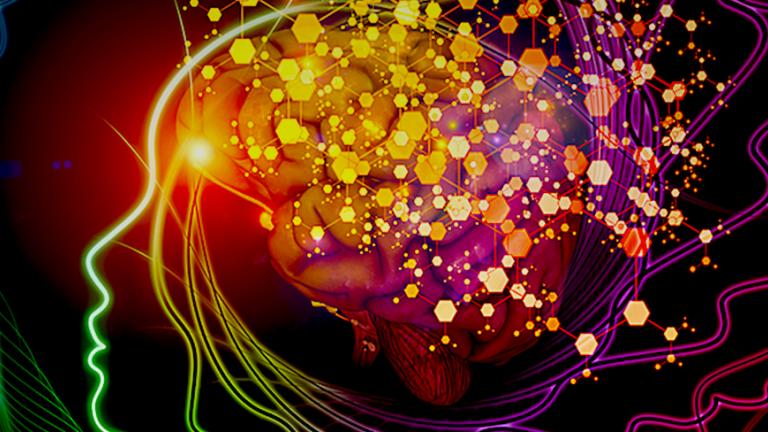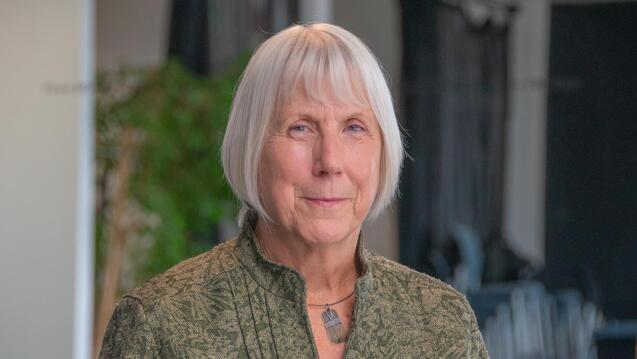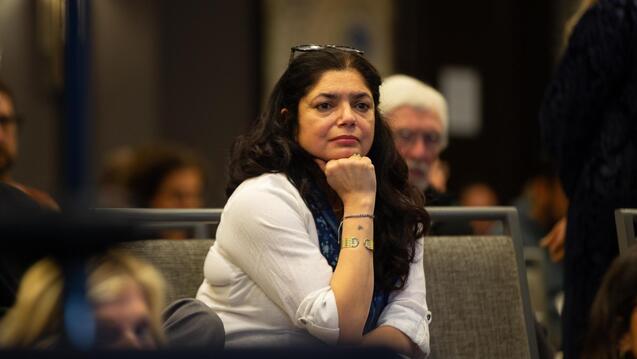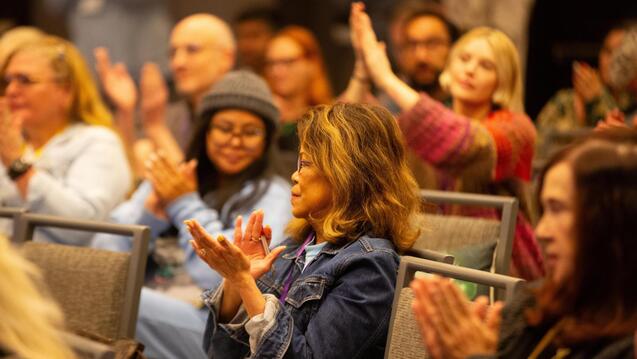Dr. Janis Phelps founded the world's first academically approved psychedelic therapy training program, preparing clinicians for a transforming field of mental health.

The Altering State of Psychedelics Research
New Certificate from Our Center for Psychedelic Therapies & Research
Word has definitely gotten around about the new Certificate in Psychedelic-Assisted Psychotherapies & Research (the Certificate). In the past nine months, there were 150 serious inquiries about the Certificate, most of them from therapists who are not from CIIS.
"They're coming in at three or four a week," says Janis Phelps, Director of the Center for Psychedelic Therapies & Research (the Center), which houses the Certificate program. "And we haven't even started the heavy publicity."
The Certificate was created to serve a growing need for trained licensed therapist guides to facilitate in future FDA-approved psychedelic- and entactogen-assisted psychotherapy research.* Research and medical experts have estimated that need at perhaps several hundred therapist guides in the next three to six years. The Certificate, which launches in Spring 2016, comprises 180 hours of comprehensive, in-depth academic training.
Phenomenal Timing
The field of research into medical applications of psychedelics, especially for the treatment of end-of-life distress, chronic PTSD, and longstanding substance abuse and addiction, is again heating up. Michael Pollan's widely popular article "The Trip Treatment," in The New Yorker, earlier this year ignited strong interest in the midst of the revival of psychedelic research.
Studies by research scientists are more regularly appearing in such prestigious publications as the Journal of Psychopharmacology and Archives of General Psychiatry, and adding new legitimacy to the field. And two summary reports on Phase II psilocybin studies by Johns Hopkins University and New York University due out in Spring 2016 are sure to further spark positive sentiment about the medicines.
With meditation and mindfulness, holism and hospice now in the vernacular and the backlash against recreational psychedelic drug use in the '60s abated, some experts believe that culturally in the United States, the time just might be right to integrate psychedelics further into mainstream medical care. Enter CIIS.
"The return of government-approved scientific research into psilocybin and related compounds has significant potential for myriad scientific and clinical studies, including the important treatment of existential distress at the end of life," says Dr. Anthony Bossis, Co-Principal Investigator of the Cancer and Palliative Care Research, Psilocybin Cancer Project at NYU School of Medicine. "The reemergence of this field will require serious multidisciplinary academic centers to address the theoretical, research, and clinical domains of this work. CIIS, with its history integrating psychology and spirituality, is uniquely and enormously qualified to meet this historic challenge," he says.
In offering the Certificate, the Center joins three of its partner organizations, Multidisciplinary Association for Psychedelic Studies (MAPS), Usona Institute, and the Heffter Research Institute (Heffter), in running successful training programs for psychedelic research therapists.
Many researchers at MAPS and Heffter are predicting that Phase III studies of MDMA and psilocybin will begin rolling out in two to four years, particularly for chronic PTSD and advanced cancer anxiety and distress. Phase III trials, which can involve patient groups of up to 3,000, are typically the definitive assessment of a drug's effectiveness. In anticipation of these events, the Center developed the Certificate program.
CIIS, with its history integrating psychology and spirituality, is uniquely and enormously qualified to meet this historic challenge.
- Dr. Anthony Bossis
Luminaries Lead the Way
CIIS' long tradition of rigorous education in contemplative mysticism, spirituality, psychedelic research, transpersonal psychology, consciousness studies, and anthropology makes the University an unparalleled place to train future therapist guides. The Certificate, though it emphasizes the therapeutic medical model of psychedelic research, will address the philosophy and theory from these other intellectual traditions as well.
MAPS and Heffter researchers as lead instructors will teach alongside Bay Area psychedelic luminaries Stan Grof and Ralph Metzner, who are longtime CIIS faculty. Members of the Center's Council of Advisors-many of them psychiatrists, psychologists, and therapists from leading universities and research centers-will be teaching in the program.
Among these well-known leaders in the field are Bossis and Jeffrey Guss (NYU School of Medicine), William Richards and Mary Cosimano (Johns Hopkins University School of Medicine), Charles Grob (UCLA), Robert Jesse (Council on Spiritual Practices), Rick Doblin and Annie and Michael Mithoefer (MAPS), Daniel Muller (University of Wisconsin School of Medicine), and psychiatrist Gabor Maté-many of whom have given lecturers and workshops sponsored by CIIS Public Programs & Performances.
Since March 2015, the Center has been providing diverse public education about psychedelic research from past decades, harm-histories of the research, as well as film screenings and book readings.
Professional Development
For licensed master's and doctoral clinicians in CIIS therapy training programs, the Certificate can be viewed as a postgraduate development opportunity.
"Ideally, the skills and knowledge learned in the Certificate program will be finalized in advanced training at a psychedelic-assisted psychotherapy research center affiliated with MAPS and/or Heffter," says Phelps. Graduates can apply for internships or scholarships at the medical centers that will provide them with mentoring and advanced training with real volunteers in FDA-approved research studies. Phelps is active in the push to reinstitute research in the Bay Area.
Students applying for the Certificate must be licensed professionals (or those seeking licensure) in mental health and medicine, or senior members of the clergy. Several scholarships are available.
Optimal enrollment is 16 for the first year and 30-plus for the second. "We have aspirations about the second year being a hybrid residential-online program to enable distance learning," says Phelps.
Graduates of the program will have a significant knowledge base in pharmacology, session preparation and later integration, competency skills, and design of research protocols. They can apply to MAPS and Heffter for on-site, advanced training and can then apply to work in actual clinical studies. There will likely be opportunities for therapists to work with psychiatrists prescribing these medicines to people during a period of "expanded access."
Expanded access refers to a process by which people with intractable mental health indications, for which few (if any) other drugs or therapies have worked to alleviate symptoms, can be eligible to be given such medicines under supervision of a physician.
"Accompanying the rebirth of psychedelic research and its many promising clinical, educational, and religious applications, CIIS has stepped forward to design a program that not only offers techniques and information, but also nurtures the psychological and spiritual maturation of future investigators and practitioners," says William Richards, of Johns Hopkins University. "It is an honor to be associated with CIIS and to contribute to the rich unfolding of this educational trajectory."
In collaboration with scientists from Heffter, MAPS, Usona, and the Council for Spiritual Practices, "innovative and inspired ideas have been implemented in the curriculum," says Phelps. "We are fully engaged and enthusiastic in spearheading this cutting-edge Certificate for psychedelic practitioners of the future."
For more information, please contact admincptr@ciis.edu
*Entactogens, also called empathogens (MDMA, MDA, ecstasy), and classic psychedelics (LSD, ayahuasca, psilocybin, mescaline) together are referred to in this article as "psychedelics."
Related Certificate Program
Related News
The Wall Street Journal spotlights the growing field of integration therapy—and features Center for Psychedelic Therapies and Research Director Dr. Janis Phelps discussing why the work that happens after a psychedelic experience is just as important as the experience itself.
As psychedelic use expands beyond clinical settings, CIIS' Dr. Janis Phelps and Center for Psychedelic Therapies and Research graduates emphasize why rigorous training and ethical practices matter—wherever psychedelics are administered.



